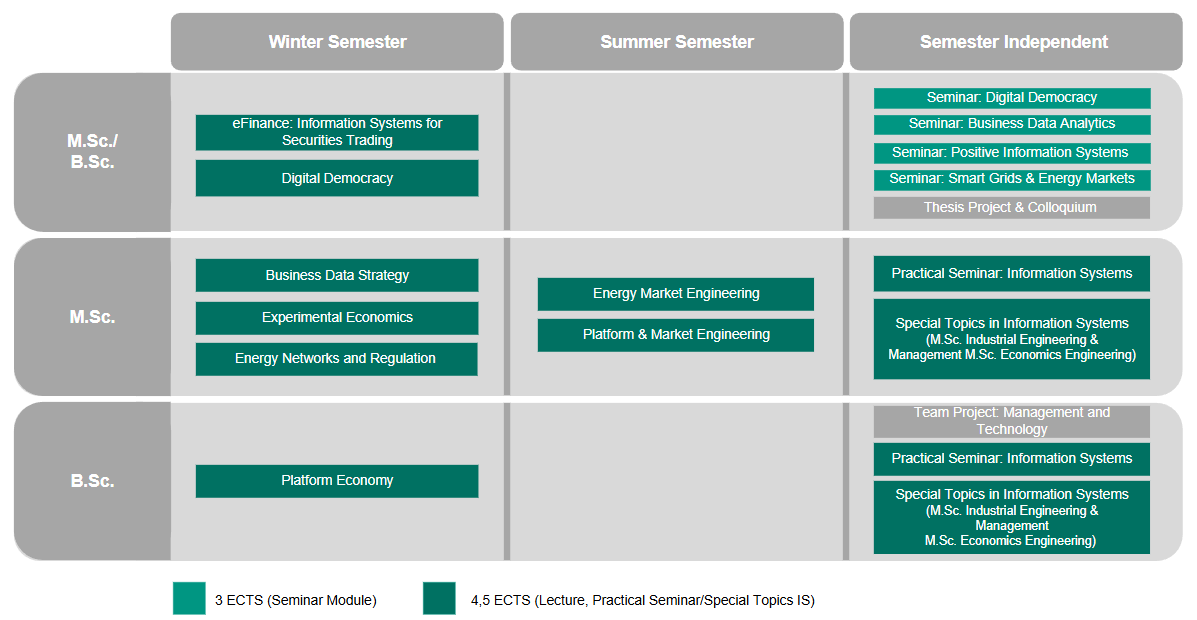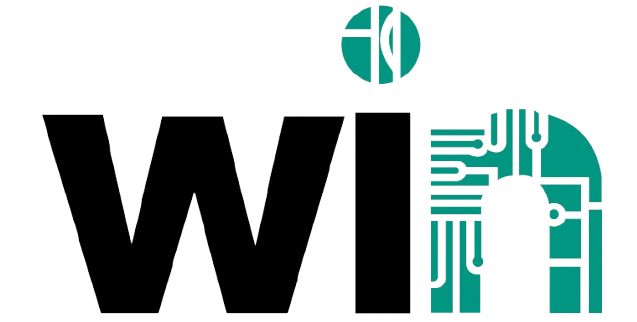Teaching Offerings

| Teaching Offering | Degree Level | Short Description |
| Lecture: eFinance: Information Systems for Securities Trading | M. Sc./B.Sc. |
The course "eFinance: Information Systems for Securities Trading" covers different actors and their function in the securities industry in-depth, highlighting key trends in modern financial markets, such as Distributed Ledger Technology, Sustainable Finance, and Artificial Intelligence. Security prices evolve through a large number of bilateral trades, performed by market participants that have specific, well-regulated and institutionalized roles. Market microstructure is the subfield of financial economics that studies the price formation process. This process is significantly impacted by regulation and driven by technological innovation. Using the lens of theoretical economic models, this course reviews insights concerning the strategic trading behaviour of individual market participants, and models are brought market data. Analytical tools and empirical methods of market microstructure help to understand many puzzling phenomena in securities markets.
Exercise: The exercise runs as a series of student-led research discussion sessions that complement the lecture. Working in small groups, students analyze frontier or foundational papers related to the course themes. The goals are to (i) deepen conceptual understanding, (ii) practice scientific work (iii) connect theory to data, and (iv) build presentation and discussion skills typical of academic and industry research forums. |
| Lecture: Digital Democracy | M. Sc./B.Sc. |
The “Digital Democracy” Lecture deals with opportunities and challenges of democracy and participation in a digitalized world. Social networks and other platforms have become a central place for human interaction.
These technologies open up many possibilities to connect people, promote societal discourse, and organize social movements. On the other hand, they are also used to undermine democracy by extremist forces.
One example is the spread of disinformation through social media, which can undermine trust in democratic institutions and exacerbate divisions in society. Big tech actors pursue their own economically driven interests, some of which run counter to societal ones.
So to what extent can Internet platforms help strengthen social discourse? And what measures can be taken to promote the quality and diversity of discourse in the digital world? What role do big tech players play in digital democracy and how can their interests be reconciled with democratic principles? These and many more questions will be explored in the lecture. The lecture introduces theoretical foundations and evidence-based research on digital democracy. It will address the following questions: What characterizes deliberative democracies, how do democracies change, and what can damage them? How does social polarization emerge and what drives it - off- and online. Accordingly, different platform types and phenomena of disinformation, such as clickbait, will be presented. The last part of the lecture series will deal with the search for approaches and alternatives to these problems.
The exercise session connected to this lecture is conducted in cooperation with an NGO and applies the lecture content in a practical context: The formulation of a data-based policy recommendation |
| Lecture: Business Data Strategy | M. Sc. |
With new methods for capturing and using different types of data and industry’s recognition that society’s use of data is less than optimal, the need for comprehensive strategies is more important than ever before. Advances in cybersecurity and information sharing and the use of data in its raw form for decision making all add to the complexity of integrated processes, ownership, stewardship, and sharing. The life cycle of data in its entirety spans the infrastructure, system design, development, integration, and implementation of information-enabling solutions. This lecture focuses on teaching about these dynamics and tools to comprehend and manage them in organisation contexts. Given the increasing size and complexity of data, methods for the transformation and structured preparation are an important tool in the process of sense–making. Modern software solutions and programming languages provide frameworks for such tasks that form another part of this course ranging from conceptual systems modelling to data manipulation to automated generation of HTML reports and web-applications. Additionally, the disruptive factor of generative AI in the scope of data management is reflected upon. |
| Lecture: Experimental Economics | M. Sc. |
Experiments have become an extremely valuable tool in the field of economic research. Almost all economic disciplines use experiments to test theoretical predictions and clarify cause-and-effect relationships. In addition to being used for empirical confirmation of hypotheses, experiments are also used for political and strategic consulting. This lecture provides an introduction to the experimental method in the field of economics and business informatics. It shows how experiments in these disciplines differ from those in the natural sciences. Exemplary economic studies are presented for illustrative purposes. |
| Lecture: Energy Networks and Regulation | M. Sc. |
Learning Goals
The student...
- understands the business model of a network operator and knows its central tasks in the energy supply system, - has a holistic overview of the interrelationships in the network economy, - understands the regulatory and business interactions,is in particular familiar with the current model of incentive regulation with its essential components and understands its implications for the decisions of a network operatoris able to analyse and assess controversial issues from the perspective of different stakeholders.
Content of teaching
The lecture “Energy Networks and Regulation” provides insights into the regulatory framework of electricity and gas. It touches upon the way the grids are operated and how regulation affects almost all grid activities. The lecture also addresses approaches of grid companies to cope with regulation on a managerial level. We analyze how the system influences managerial decisions and strategies such as investment or maintenance. Furthermore, we discuss how the system affects the operator’s abilities to deal with the massive challenges lying ahead (“Energiewende”, redispatch, European grid integration, electric vehicles etc.). Finally, we look at current developments and major upcoming challenges, e.g., the smart meter rollout. Covered topics include:
- Grid operation as a heterogeneous landscape: big vs. small, urban vs. rural, - TSO vs. DSOObjectives of regulation: Fair price calculation and high standard access conditions - The functioning of incentive regulation - First major amendment to the incentive regulation: its merits, its flawsThe revenue cap and how it is adjusted according to certain exogenous factors - Grid tariffs: How are they calculated, what is the underlying rationale, do we need a reform (and which)? - Exogenous costs shifted (arbitrarily?) into the grid, e.g. feed-in tariffs for renewable energy or decentralized supply.
Bibliography: Linnemann, M. (2024). Energiewirtschaft für (Quer-)Einsteiger: Einmaleins der Stromwirtschaft. Deutschland: Springer Fachmedien Wiesbaden. Averch, H.; Johnson, L.L (1962). Behavior of the firm under regulatory constraint, in: American Economic Review, 52 (5), S. 1052 – 1069. Bundesnetzagentur (2006): Bericht der Bundesnetzagentur nach § 112a EnWG zur Einführung der Anreizregulierung nach § 21a EnWG, https://data.bundesnetzagentur.de/Bundesnetzagentur/SharedDocs/Downloads/DE/Sachgebiete/Energie/Unternehmen_Institutionen/Netzentgelte/Anreizregulierung/berichteinfuehrganreizregulierung.pdf. Bundesnetzagentur (2015): Evaluierungsbericht nach § 33 Anreizregulierungsverordnung, https://www.bmwi.de/Redaktion/DE/Downloads/A/anreizregulierungsverordnung-evaluierungsbericht.pdf?__blob=publicationFile&v=1. Filippini, M.; Wild, J.; Luchsinger, C. (2001) : Regulierung der Verteilnetzpreise zu Beginn der Marktöffnung. Erfahrungen in Norwegen und Schweden, Bundesamt für Energie, Bern, http://www.iaea.org/inis/collection/NCLCollectionStore/_Public/34/066/34066585.pdf. Gómez, T. (2013): Monopoly Regulation, in: Pérez-Arriaga, I.J. (Hg.): Regulation of the Power Sector, S. 151 – 198, Springer-Verlag, London. Gómez, T. (2013): Electricity Distribution, in: Pérez-Arriaga, I.J. (Hg.): Regulation of the Power Sector, S. 199 – 250, Springer- Verlag, London. Pérez-Arriaga, I.J. (2013): Challenges in Power Sector Regulation, in: Pérez-Arriaga, I.J. (Hg.): Regulation of the Power Sector, S. 647 – 678, Springer-Verlag, London. Rivier, M.; Pérez-Arriaga, I.J.; Olmos, L. (2013): Electricity Transmission, in: Pérez-Arriaga, I.J. (Hg.): Regulation of the Power Sector, S. 251 – 340, Springer-Verlag, London. |
| Lecture: Platform Economy | B.Sc. |
Lecture and Exercise
The "Platform Economy" lecture provides a broad range of knowledge related to online platforms and their business models, examining their significance for users, operators, and society as a whole. The course is structured into 8 topical blocks, each exploring a different aspect of the platform economy in depth. Each block is led by a different lecturer who is an expert in the respective topic. The key topics covered in the lecture include:
Network Effects and Two-Sided Markets Business Models and Auctions Energy Market Engineering Digital Involvement: Crowd X & Citizen Science Digital Democracy and Social Media Analyzing User Behavior Trust and Reputation in Digital Platforms Ethical Considerations in the Platform Economy
To reinforce the lecture material, each block is accompanied by interactive exercises that encourage a deeper understanding of the topics. In these exercises, students will engage in discussions and explore practical examples that illustrate the theoretical concepts introduced during the lectures. The lecture and exercise also offer a chance to get an idea of the lectures offered during the master's program at our chair.
Case Study
In addition to the lectures, you will work on a case study in small groups. Your task will be to develop a business model for an innovative and novel online platform, which will be presented to you by one of our experts, either from the academic team or the industry. This case study offers a chance to gain deeper insights into current trends in the platform economy and to apply the knowledge acquired throughout the course in a practical, hands-on way. |
| Seminar: Business Data Analytics | M. Sc./B.Sc. | Seminar on various, individual topics concerned with "Business Data Analytics". |
| Seminar: Digital Democracy | M. Sc./B.Sc. | Seminar on various, individual topics concerned with "Digital Democracy". |
| Seminar: Positive Information Systems | M. Sc./B.Sc. | Seminar on various, individual topics concerned with "Positive Information Systems". |
| Seminar: Smart Grids and Energy Markets | M. Sc./B.Sc. | Seminar on various, individual topics concerned with "Smart Grids and Energy Markets". |
| Team Project Management and Technology | B.Sc. |
The team projects aims to prepare students for working in heterogeneously composed teams. A team of 4-5 students will work on defined interdisciplinary questions at the interface of management and (information) technology subjects. The result of the projects should typically not only be a presentation or a report, but an artifact, e.g. a method, an algorithm, a model, a software or a component. The team projects already implement the concept of research-oriented teaching in the Bachelor's degree and aim to build up problem-solving competence in the students. |
| Practical Seminar: Information Systems | M. Sc. |
Practical seminars are part of several modules and provide an alternative to traditional lectures with 4,5 ECTS. In practical seminars, students get an individual assignment and develop a running software prototype. Beside the software prototype, the students also deliver a written documentation. |
|
Special Topics in Information Systems |
M.Sc. |
The Special Topics Information Systems is equivalent to the practical seminar, as it was only offered for the major in “Information Systems” so far. With this course students majoring in “Industrial Engineering and Management“ and “Economics Engineering” also have the chance of getting practical experience and enhance their scientific capabilities. |
| Thesis Project & Colloquium | M. Sc./B.Sc. |
The main goal of the thesis colloquium is to foster exchange between students (e.g., with similiar thesis topics or research methods). Furthermore, it is an opportunity for you to practice presentation and feeback-giving skills. Each thesis student of the research group is expected to attend the thesis colloquium. |

